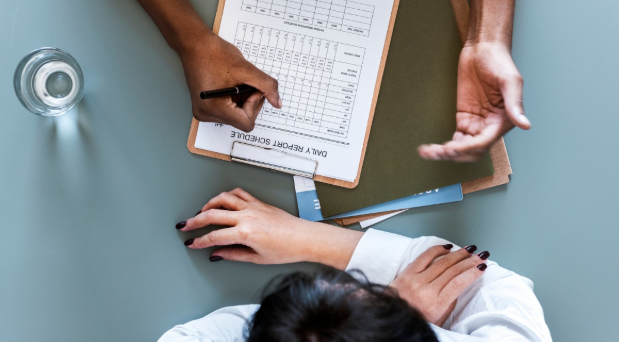Polygraph exams are often subjected to various standards to ensure accuracy and reliability.
For starters, lie detector tests must adhere to certain forensic practices to be legally defensible. There are ethical considerations to be aware of, too, including obtaining an examinee’s informed consent, maintaining objectivity throughout the questioning, and upholding applicable data privacy laws.
Moreover, polygraph tests vary depending on whether they’re private or public sector oriented.
Read below for the defining features between lie detector tests conducted in private and public settings.

Similarities Between Private and Public Sector Polygraphs
1. Both Utilize a Similar Instrument
All polygraph tests rely on the polygraph, an instrument that detects deception by analyzing variations in physiological responses controlled by the autonomic nervous system (ANS). Those include breathing rate, skin conductivity, blood pressure, and heart rate.
To administer a polygraph test, special sensors are attached to an examinee’s body to track changes in the various ANS-controlled parameters.
Deviations from the subject’s baselines are recorded in real-time and the findings analyzed after the test, enabling examiners to infer deception or truthfulness.
2. Both Follow a Similar Methodology
Perhaps the first image that springs to mind when we think of polygraphs is of a criminal suspect holed up in an investigation room, with sensors strapped all over their body. However, a lot goes into scheduling a successful lie detector test.
The polygraph process typically commences from the pre-test phase, during which an examiner prepares the would-be examinee for the upcoming test. Critical events here include informing the examinee of the test subject, obtaining the examinee’s written consent, and recording their physiological baselines.
Next comes the in-test phase. Here, a polygraph examiner asks a series of questions and records the examinee’s responses in each case.
Finally, there’s the post-test phase. This stage entails going over the examinee’s responses before preparing a final report.
3. Both Require Professional Examiners
Whether you’re scheduling a private or public sector lie detector test, it’s best to work with a qualified examiner.
Insist on someone who graduated from an APA (American Polygraph Association)-accredited school and underwent 1 – 2 years of internship. The examiner should also possess valid licensing if they practice in jurisdictions that require polygraphers to be licensed.

Differences Between Private and Public Sector Polygraphs
1. Examiner Qualifications
While both private and public sector polygraphers must possess valid credentials from an APA-approved school, they differ in the scope of qualifications required.
Private examiner courses typically last 10 – 13 weeks, while public examiners (particularly those contracted by federal agencies) can undergo up to six months of study.
2. Testing Environment
Public sector polygraph examiners usually work for government institutions. Those include federal, state, and local law enforcement agencies, as well as federal institutions like the FBI, DEA, and DoD.
Private sector examiners are more flexible. They can be contracted by the government or non-governmental entities like rehabilitation centers, relationship therapists, sporting federations, etc.
3. Voluntary versus Mandatory Testing
The Employee Polygraph Protection Act (EPPA) prohibits employers from using polygraph tests to screen job applicants.
Most private sector employers cannot compel their employees to take a lie detector test. Therefore, employees can decline requests to be polygraphed without suffering victimization. Coercing your employees to take a lie detector test can result in hefty penalties from the U.S. Labor Department.
In contrast, polygraph exams are mandatory in many government institutions. The FBI and DoD have all admitted to using lie detector tests for counterespionage purposes.
Some federal agencies also administer lie detector tests as part of government contracting or immigration processing.

4. Investigative Purposes versus Standard Procedure
Most private sector polygraphs are designed to investigate specific incidents. It could be workplace thefts, infidelity allegations, substance abuse, etc.
The tests may investigate single events or a chain of connected occurrences. Once the process is complete, examiners submit their findings to relevant authorities – employers, therapists, etc.
Meanwhile, many public sector polygraphs are administered as standard procedures. That means you may undergo a lie detector test when applying for defense tenders, even if your credibility hasn’t necessarily been attacked.
5. Testing Scope
Polygraph tests can vary considerably in scope, based on the case at hand. You’d expect a homicide suspect to undergo more rigorous testing than a cheating partner.
However, most private sector polygraphs are limited in scope compared to public sector examinations. That’s because findings from public sector lie detector tests can have far-reaching implications.
Government agencies may rely on a polygraph report to decline your tender application, deny you a job opportunity, or even prefer criminal charges against you. Therefore, there’s a need for extensive testing to prevent undue victimization.
In the private sector, polygraph findings are mostly for consumption by a few stakeholders – married couples, employers, therapists, etc.

Upholding Polygraph Reliability in the Private and Public Sectors
Private and public sector polygraphs may differ in the intended testing environment and the target issue. However, both techniques are subject to similar regulatory guidelines.
As previously mentioned, all lie detector tests must conform to the industry’s best practices on evidence collection and preservation. The exams must also be conducted in a manner that upholds the examinee’s fundamental rights. Those include the right to informed consent, fair trial, and privacy.
One best practice when conducting a legally admissible polygraph test is to follow proper question design rules. Each exam (whether administered in a private or public sector) must also encompass all three major phases, with a focus on preparing the examinee adequately for the in-test phase.






